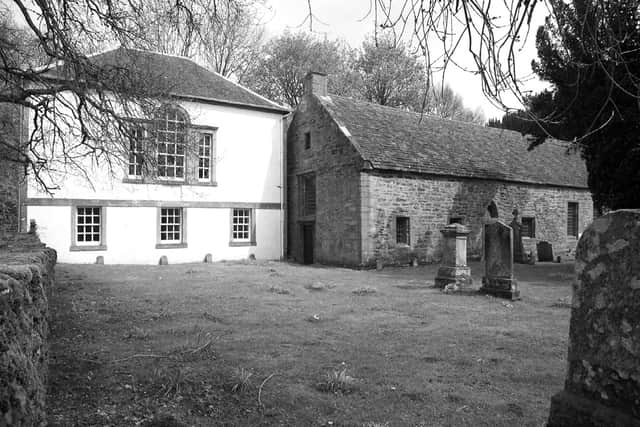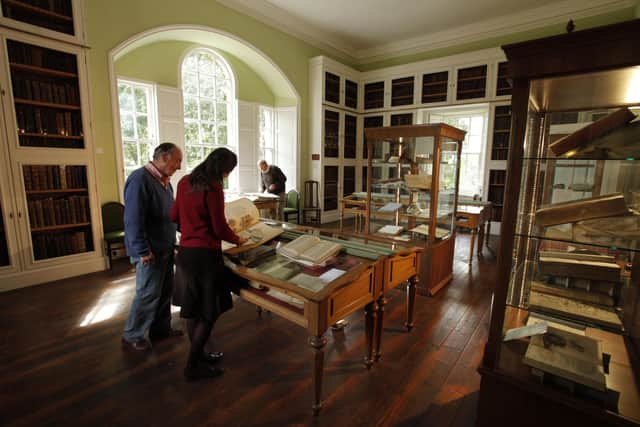Support our Libraries: history shows the crisis of the public library is nothing new
Established by the local squire, Lord David Drummond, in 1680, the library became a common resource for the local community. Men and women from the estate and nearby farms came across the fields to borrow a novel, a history book or a religious text. Today, Innerpeffray is a place of pilgrimage for book lovers around the world, and a monument to Scotland’s long-lived democratic reading culture. Mediaeval Scotland had four universities at a time when England had only two; five hundred years later, this year’s Times University Guide placed five Scottish universities in the UK top 20.
Yet while our universities flourish, there is a crisis in our public libraries. Councils all over Scotland are forced to reassess the future of their library network. Many branches have not reopened after the pandemic closures; perhaps some never will. Why has it come to this?
Advertisement
Hide AdAdvertisement
Hide AdIf we look back through history, we see this crisis of the public library is nothing new. Ever since mankind could communicate in writing, people have made and collected books – first on papyrus scrolls, then on parchment made of animal skins. Archaeologists lately found the foundations of a ninth-century parchment factory at Portmahomack in Easter Ross. But in the mediaeval period, building a collection of books was the prerogative of the rich and institutions like monasteries. It required the introduction of printing and a new cheaper medium, paper, to spread the joys of book ownership beyond the elite.


Even so, the sudden glut of books with the printing revolution (there were probably a billion copies in circulation by 1700), did surprisingly little to advance the cause of public libraries. Great men sometimes opened their collections to favoured scholars, but more to show off their taste and wealth than through altruism. Universities did no better: most allowed students access to the library for only four hours a week, and then only if the librarian could be bothered to find the key.
Yet people continued to dream of a network of public libraries to serve the people, none with more enthusiasm than the Scottish churchman James Kirkwood. Around 1700, Kirkwood proposed to send a small library, a chest of books, to every parish in Scotland, so that “all sorts of learning may mightily increase and flourish amongst us, and though we be not a great or rich people, yet we may be a wise and learned people”. Kirkwood raised a substantial sum of money, but since his 12-point plan required all parish ministers to devote their own books to the church, co-operation was tepid. By the 19th century, all of the books had been dispersed, and none of the 77 libraries he had founded remained.
The 19th century brought new industrial cities, new readers and a new demand for books. A landmark public libraries Act in 1850 allowed councils to raise a penny rate to build a library, but few took advantage of this. When it came to a local vote, brewers spent freely to ensure it was rejected. This was not just parsimony or ignorance: in many communities, like the Lancashire mill towns Halifax and Huddersfield, there were already multiple libraries, run by the Co-operative Movement, the Mechanics’ Institutes or local employers. Here, or in circulating libraries run by local bookshops, working men and women could find the books that they wanted to read, rather than what librarians thought was good for them – a sort of well-meaning paternalism that would plague the public library movement through to the 1960s.
It required another visionary Scot, Andrew Carnegie, to rescue the public library movement, and Carnegie had the vision and resources to carry his plan to fruition. A son of Dunfermline, Carnegie had made his fortune in the United States; when he sold out to J.P. Morgan in 1901 to concentrate on philanthropy, he was America’s richest man. Carnegie offered local authorities in Britain and the US a shrewd deal: he would provide the money to build a library, as long as the council would maintain it. Between 1890 and 1914, some 2,000 Carnegie libraries were erected around the world, and the public library was reborn.


You can still see them all over Scotland, from Wick and Thurso to the Scottish border. The Beatles played Dingwall in the Carnegie library in 1962; the Dunfermline library, the first in Scotland, has just undergone a magnificent remodelling, preserving the original Carnegie rooms with a modern extension. But again, time moves on. Many Carnegie libraries are now too small to meet local needs: in Dingwall, as elsewhere, the library has now moved to an integrated complex containing a new high school and swimming pool.
The 50 years after Carnegie’s transformative campaign were really the golden age of the public library: during the Second World War, especially, people valued their libraries. But this era also sowed the seeds of future discontents. The coming of the paperback, with the foundation of Penguin books in 1935, posed an existential threat to the library. Now readers could buy a novel or work of contemporary non-fiction for a fraction of the cost of the hardback titles that were the mainstay of the libraries. And no-one anticipated that Allen Lane’s throwaway books would be collectable. Soon the public library’s core clientele was peeling off to make their own collections at home.
So the current crisis of the library is not a new phenomenon of the digital age, but part of a recurrent pattern of collecting, dispersal, recreation and destruction that goes all the way back to the Roman Empire. Nothing stands still, or remains forever. Even where libraries remain open, weeding the collection to find room for new books is an everyday task of librarians.
Advertisement
Hide AdAdvertisement
Hide AdWhen we began the research for our history of libraries, we talked to both council officials and campaigners protesting against closures in Scotland and London. The London campaigners acknowledged that they were not themselves regular users of the branch they wished to save, and when we visited the under-threat building, a Victorian benefaction that predates Carnegie, we found people using computers and newspapers but none consulting the book stock. And councils, unlike the UK government, cannot print money: they have to balance the value of the library service with other urgent calls on their resources. The Scotland on Sunday campaign is asking the same question of their readers, and a public debate about the future of the library is greatly to be welcomed. The best place to start may be to recognise that the campaigners and council officials both value public services and books. And keep in mind that the death of the book has often been prophesied, but never yet occurred. The book, and libraries, have served our civilisation well for two thousand years, always evolving and multiplying. They will be around for a long time to come.
The Library: A Fragile History, by Andrew Pettegree and Arthur der Weduwen, from St Andrews University, will be published by Profile at £25 hardback/ebook on October 14.
Comments
Want to join the conversation? Please or to comment on this article.